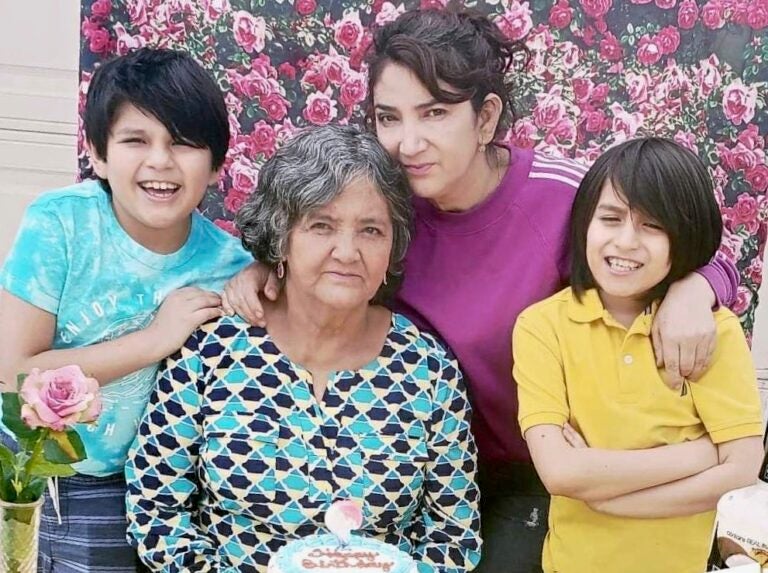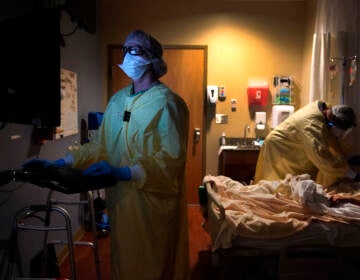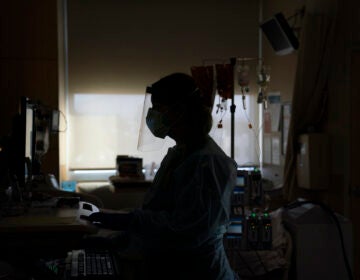Philly Latinos are under-tested for COVID-19
There are many potential hurdles between Philly Latinos and a COVID-19 test — even though they're contracting the virus at high rates.
Listen 18:26
Bertha Gonzalez (middle right), her mother Floria and her twin sons Sebastián and Santiago at her mother’s 70th birthday this April. Floria contracted the coronavirus in July. (Courtesy of Bertha Gonzalez)
Latinos in Philadelphia make up 15% of the city’s population — but only 6% of those who’ve gotten tested for COVID-19. In fact, they’re getting tested at the lowest rate of any racial and ethnic group in the city, despite contracting the virus at high rates. When WHYY health reporter Nina Feldman spoke to Latino residents and community leaders, she learned there are several reasons why, including language barriers, anti-immigrant policies and sentiments, as well as limited job security and access to health insurance.

Hear the whole story on The Why
Interview Highlights
On what it took for one woman, Veronica Perez, to get a COVID test
She called around to different pharmacies and different hospitals and it was really hard for her to communicate. She doesn’t speak English very well, and people would answer in English, and they didn’t have anybody they could pass her off to to translate. Oftentimes she understood sort of enough to know that they were saying she needed a doctor’s note or that they didn’t take people who weren’t already patients in their system. But every place she called was just a dead end.
She’s a part of a community leadership group through Drexel called Crisol. So through Crisol, she finally was connected to Penn Medicine to get a test. She had to sort of communicate using hand signals and sign language. I think even that was a pretty taxing experience. She’s got a fever. She’s wearing a mask. It’s a lot to ask somebody to even leave the house in that situation, let alone have to do it in a foreign language.
On how federal anti-immigrant sentiment impacts access to health care
There is a lot of fear from undocumented people, or people who have undocumented family members, or people who are here legally, but are applying for citizenship status, that really causes them to stay away from anything perceived as contact with a bureaucracy or a government agency that could be in contact with ICE or Customs and Border Patrol … This dynamic is something that I talked a lot about with Ana Martinez-Donate. She’s a professor of community health and prevention at Drexel University. [She says,] “There’s fear that immigration authorities may be enacted and it might be consequences for them, including the potential of deportation. And it’s going to increase hesitation and sometimes is just doing to lead to avoiding health services at all costs.”
And it’s not just undocumented people either. There is a new policy, a Trump administration policy known as the public charge rule. Basically, what it says is anybody who’s applying for citizenship that was awarded public benefits before they were a citizen — so even if, you know, they have a green card and they are on food stamps or they are a Medicaid recipient — those elements might count against them in a citizenship application. And that rule actually just went into effect earlier this month.
COVID-19 testing and treatment does not count towards the public charge rule. But a lot of people don’t know that. And there’s been so much confusion around the policy to begin with that I think a lot of people just assumed it was in place and refrain from accessing benefits as a result.
On the impact health care barriers have on the Latino community
Latinos in Philadelphia have been dramatically under-tested for COVID-19. According to U.S. Census data, Philadelphia is more than 15% Latino. But Latinos make up only 6.2% of those who’ve been tested for coronavirus in the city … In Philadelphia, Latinos over 75 have the highest death rate over any other group. I can’t say why that is exactly. But based on everything I heard in this reporting, if I had to hazard a guess, I think it’s not unlikely that people are really resistant to going to the hospital for a lot of reasons. And if you wait a really long time before you go to the hospital and you get sicker and sicker, and by the time you go, there’s less that doctors can do for you.
WHYY is your source for fact-based, in-depth journalism and information. As a nonprofit organization, we rely on financial support from readers like you. Please give today.







